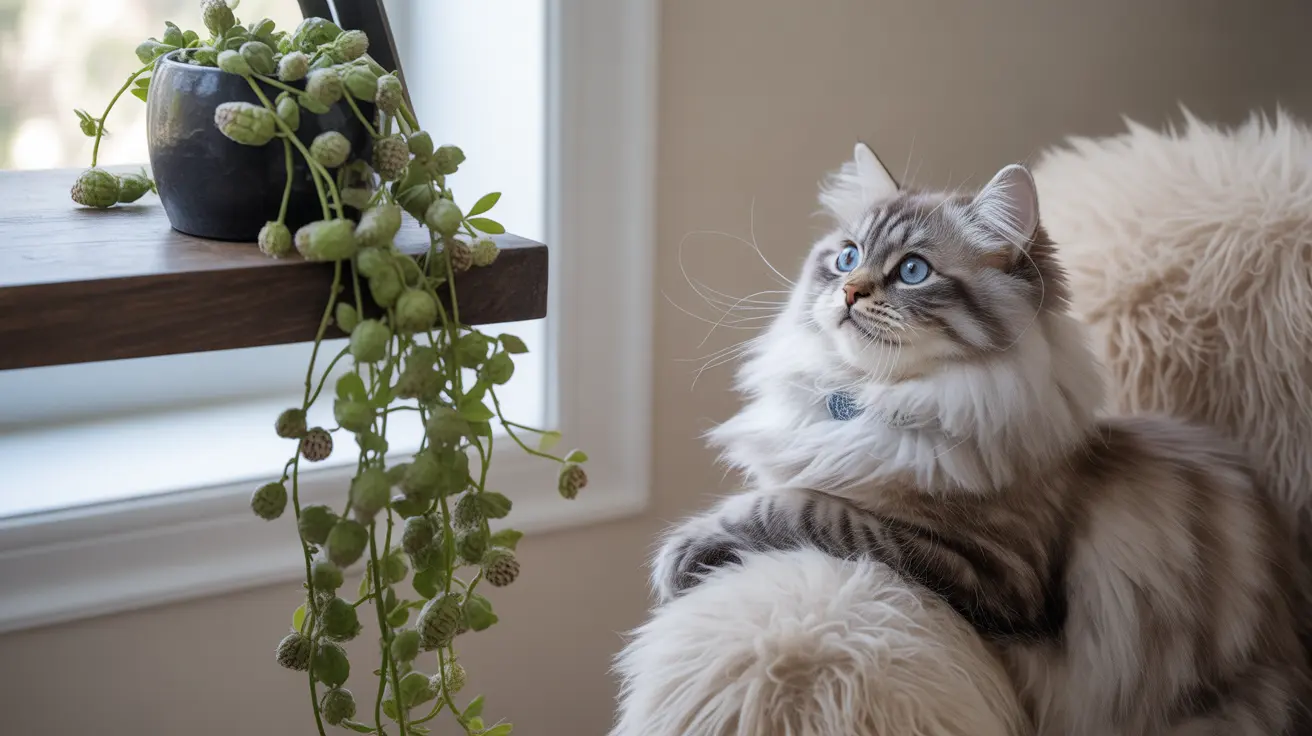If you're a cat parent who loves houseplants, you've probably wondered about the safety of String of Turtles (Peperomia prostrata) around your feline friends. The good news is that this charming trailing plant with its distinctive turtle-shell patterned leaves is officially classified as non-toxic to cats.
However, while String of Turtles won't cause serious harm to your cat, there are still important considerations for keeping both your plant and pet safe. Let's explore everything you need to know about String of Turtles and cat safety, including potential risks, prevention tips, and what to do if your curious kitty takes a bite.
Understanding String of Turtles Plants
String of Turtles is a delicate trailing plant native to Brazilian rainforests. Its small, round leaves feature intricate patterns resembling turtle shells, making it a popular choice for hanging baskets and shelf displays. The plant typically grows 12-24 inches long and belongs to the Peperomia family, known for being generally pet-safe.
Safety Profile for Cats
According to veterinary authorities and organizations like the ASPCA, String of Turtles is confirmed non-toxic to cats. This means ingestion won't cause severe poisoning or life-threatening reactions. However, like many houseplants, it can still cause mild digestive upset if eaten.
Potential Side Effects
While not toxic, cats who nibble on String of Turtles might experience:
- Mild stomach upset
- Temporary drooling
- Minor mouth irritation
- Occasional vomiting or diarrhea
Prevention and Plant Placement
Even though String of Turtles isn't toxic, it's best to prevent your cat from making it a snack. Consider these placement strategies:
- Mount plants in hanging baskets
- Place on high shelves
- Use cat deterrent sprays around plant areas
- Create dedicated "cat gardens" with cat grass to redirect interest
Monitoring Your Cat
If you notice your cat showing interest in your String of Turtles plant, watch for these behaviors:
- Excessive drooling
- Pawing at the mouth
- Changes in eating habits
- Signs of stomach discomfort
- Unusual lethargy
Safe Plant Alternatives
While String of Turtles is safe, consider these other non-toxic options for a cat-friendly home:
- Spider plants
- Boston ferns
- African violets
- Calathea varieties
- Other Peperomia species
When to Contact Your Vet
Though serious reactions are rare, contact your veterinarian if your cat shows:
- Persistent vomiting
- Prolonged lethargy
- Severe drooling
- Signs of significant discomfort
- Refusing food or water for more than 24 hours
Frequently Asked Questions
Is the String of Turtles plant safe for cats to be around or nibble on?
Yes, String of Turtles is classified as non-toxic to cats. While nibbling isn't recommended, it won't cause serious harm beyond possible mild stomach upset.
What symptoms should I watch for if my cat eats some of my String of Turtles plant?
Watch for mild symptoms like drooling, slight stomach upset, or temporary mouth irritation. Serious symptoms are rare but contact your vet if you notice persistent vomiting or lethargy.
How can I prevent my cat from chewing on my String of Turtles houseplant?
Place plants out of reach, use hanging baskets, create physical barriers, and provide alternative cat-safe plants like cat grass to redirect your pet's attention.
What should I do if my cat shows signs of illness after eating String of Turtles?
Monitor your cat closely and contact your veterinarian if symptoms persist or worsen. Most cases resolve on their own, but professional guidance is always recommended.
Are there other non-toxic plants similar to String of Turtles that are safe for homes with cats?
Yes, other safe options include spider plants, Boston ferns, African violets, and other Peperomia varieties. Always verify plant safety through reliable sources like the ASPCA.
Remember, while String of Turtles is safe for homes with cats, the best approach is still prevention. With proper placement and monitoring, both your plants and pets can thrive together harmoniously.






